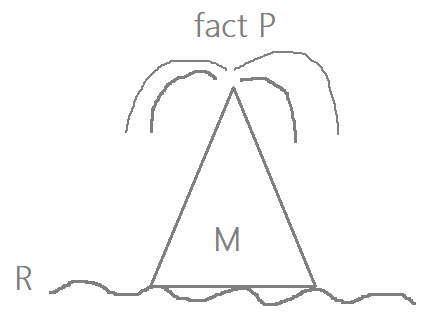Goldman and Dretske on knowledge
Alvin Goldman makes another hypothesis to the traditional account of knowledge for the fact that Smith cannot be said to know P. What makes P true is the fact that Brown is in Barcelona, but this fact has nothing to do with Smith’s believing P. That is, there is no causal connection between the fact that Brown is in Barcelona and Smith’s believing P. If Smith had come to believe P by reading a letter from Brown postmarked in Barcelona, then we might say that Smith knew P. So, the belief in P is not caused in a right way. There should be a causal chain between the fact P and the belief in P.
So, traditional account is not sufficient because:
- we cannot have premises that are false,
- there is no causal connection between
P and what makes P true.
In this case, Goldman’s account of knowledge would be formulated in such a way: S knows that P if and only if the fact P is causally connected in a appropriate way with S’s believing P. Appropriate processes include:
- perception
- memory
- a causal chain correctly reconstructed by background propositions which help warrant an inference only if they are true. It refers to inferential knowledge.
- combination of 1,2,3.
Suppose that the mountain erupts, leaving lava around the countryside. The lava remains there until S perceives it and infers that the mountain erupted. Then S does know that the mountain erupted. 
- M is for mountain.
- Fact P is for “Mountain erupted”.
- R is for reason to believe that mountain erupted (solidified lava).
I do not see lava erupting, but I see effects (R) that serve as inferential knowledge. There is continuous causal chain of background propositions. If, for example, we remove the lava and put it back, the causal chain would be broken and I cannot be said to know the fact P (mountain erupted).
In regard to Goldman’s account of knowledge, Fred Dretske states that it is still possible to have accidental knowledge. He introduces a conclusive reasons’ condition. S knows that P if S has reason R for P, in such a way that if P were not the case, person S would not have reason R.
So, Dretske’s account of knowledge is as follows:
- P is true
- S believes that P
- Given reason R and circumstances C (all those circumstances that are logically and causally independent of P) it is not physically possible that ∼ P
Given R ( solidified lava in the countryside), it is not physically possible that M (mountain) did not erupt.
Bibliography:
- Alvin Goldman: “A Causal Theory of Knowing” in The Journal of Philosophy v. 64 (1967), pp. 357–372.
- Fred Dretske: “Conclusive Reasons” in Australasian Journal of Philosophy v. 49 (1971), pp. 1–22.